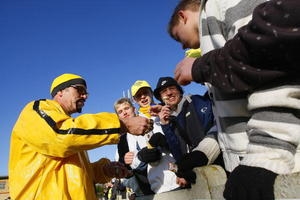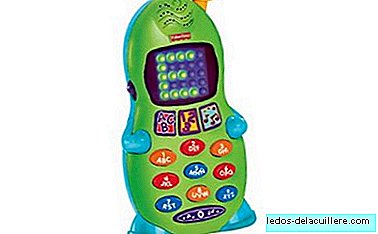
In the current schools in which technology plays a fundamental role as a support on which many of the educational processes are based, it is necessary to create the profile of the ICT coordinator (information technologies) whose mission will be to transmit the illusion and knowledge of the impact of technologies on learning. In Peques and Más we bring an interview with Mercedes Bernal, ICT Coordinator at SEK Santa Isabel from Madrid. Mercedes has a degree in Philosophy and Educational Sciences from the University of Salamanca and has the Master's Degree in Primary Education by the Camilo José Cela University (UCJC). Mercedes has extensive experience in training in Spain and abroad. He started in Asturias as a pedagogue and in 2001 he arrived in Madrid with a scholarship in New Technologies to work at the National Center for Educational Information and Communication (CNICE). Between 2005 and 2009 he expanded his teaching experience in England and in Turkey. Since September 2009 she works at the SEK Institution as an ICT Coordinator.
What functions does an ICT coordinator perform at SEK Santa Isabel School?
One of the main functions of the ICT coordinator is to boost the use of technology in the service of education. Disseminate good practices and educational benefits that technology offers us and, on the other hand, support ongoing teacher training.
This requires a constant update and analysis of the latest developments in technology and on the other hand have extensive pedagogical knowledge that allows you to have a deep vision of the teaching-learning process.
How is the experience with the use of technological tools oriented to education?
I think that the idea that education must be in line with the society of the 21st century is already widespread throughout the Educational Community, and that digital skills and abilities are fundamental in all the agents that comprise it.
In SEK Colleges we have been using technology in our daily operation for many years and at this time it is already an element in our daily practice. It is true that there are teachers who have it incorporated into their teaching work and others who are still in the process of training.
Learning digital skills and abilities is essential
Tell us, please, the experience with educational tools from regular suppliers
It is very different what some tools provide us with others. For example, Google Drive allows us to work collaboratively and in a team, in a pleasant and easy way. We use for example Microsoft 365 with accounts student.sek.es They are associated with Microsoft thanks to a collaboration agreement with them and it is giving us very good results. In the case of Mathletics it is a formula that motivates the student individually by allowing him to advance in his speed and calculation ability and to be able to measure himself against other users who are practicing in different countries and simultaneously.
How do teachers integrate the use of technology in learning?
For years in each class there is interactive whiteboard and personal computer used by all professionals of the Center and used in group activities either supplementing the traditional board or incorporating greater interactivity to the explanations. When students have to inquire about any aspect related to their Work Unit they have different technological devices as tools for their individual or group activities. In some upper Primary courses we have also begun to replace paper books with existing digital resources and content that are beginning to be prepared by the teachers themselves.
We are replacing paper books with digital resources
How much does it cost teachers to learn to use technology and take advantage of classes?
The school is a true reflection of reality, so we find that there are as many levels of digital competence as teachers. In general, and given that new technologies are already incorporated into our daily lives, the minimum level is covered by all teachers although the degree of incorporation into teaching practice is uneven. I think that aspects such as age and motivation are decisive in terms of adaptation to new technologies and digital tools. Apart from the support and training that teachers receive from the Technology department, on some occasions, it is the students themselves who help the teachers to use the technology and solve those small incidents that may arise and momentarily block the development of the class.
What techniques are you applying in the training of students: gami fi cation, blogs, group work, international collaboration, etc.?
In the School, ICTs are incorporated into the teaching and learning process, students use them as optional tools and complementary to their inquiries and school experiences. Depending on the needs raised, they can use one technique or another, such as: blogs in each course are the channel where teams of teachers share resources or report relevant events of the school and the progress of the course, tools on collaborative lines such as Microsoft 365, Onedrive, GoogleDrive, wikis or virtual walls serve as a framework for collaborative activities, projects in Scratch, Kodu, thematic Apps that reinforce learning through play, video conferencing with Skype or Lync bring experiences between different countries, etc. .
In addition, in the specific computer class that all Santa Isabel students enjoy from Infant to Primary, these and other more specific techniques are worked sequentially so that all of our students reach a high level of digital competence.
On some occasions students themselves help teachers to use technology in class
How can parents help to know and practice the use of ICT with our children at home?
It is true that the younger generations, having been born in a technological environment such as the society in which we live, makes them digital natives in terms of their use and familiarity. However, we cannot forget that because of their status as young people they need reference models to grow as healthy, balanced and judicious people. That is where parents should help and guide them to acquire healthy behaviors.
It is the parents who primarily must be vigilant to prevent addictions, encouraging a controlled use of social networks and mobile devices. On the other hand, parents are the ones who decide what type of computer or device to buy their child, where to place it in the house, how often it will be used, etc. As in everything, the training of children and technology is already part of education, it must be addressed by various agents: school, family, friends. Parents therefore play a very important role in this area.
Do we have to let children learn programming and robotics in schools?
Without a doubt. Educational robotics is a discipline, which does not seek to turn children into programming experts. Its meaning and purpose in the elementary stage is to stimulate in our students competences of creativity and innovation, critical thinking and problem solving, communication, information management and technologies. Along with this, educational robotics in its construction and assembly phase develops the manipulative and spatial orientation aspects. And all this under a highly motivational playful prism.
What successful experiences exist in Spain about training in programming and robotics?
Until a few years ago, robotics and programming were limited in the higher stages of education and more specifically in the branch of Science. Fortunately, the action framework and its methodological perspective have been expanded, resulting in interesting experiences in Primary. Recently we started to introduce some very interesting experiences also in the children's stage. There are very innovative examples in schools in the Basque Country and Catalonia.
At national and international level Lego is leading educational projects already consolidated as First Lego League and start other business initiatives like Volvo which addresses Road Safety from robotics and technology. Nonprofit associations and groups of families and children interested in this world are also proliferating that are expanding the field of work.
In SEK Colleges, for example, we have been introducing educational robotics in our own curriculum for a few years. We had started with an extracurricular offer but it was quickly seen that the official curriculum could be enriched with the contribution of robotics. Thus, in all our SEK schools, robotics is taught within the curriculum in areas such as Science, Technology and we are beginning to work with projects related to Emotional Intelligence and Language.
Our society is increasingly changing, global and competitive
What are the professional skills that will be demanded in the future and how can robotics help to achieve them?
Our society is increasingly changing, global and competitive. I think that those people who have a greater capacity to adapt to change and take on challenges are more likely to be more efficient in their work performance.
On the other hand, with this work methodology our students learn skills for personal and professional life such as teamwork, leadership and responsibility, flexibility and adaptability to different contexts and environments that facilitate a meaningful and motivating learning.
What is the recommended age for children to approach robotics?
This year we will start working with a robotics project in children. Through some robots called Bee botsInfant students will learn to move a small bee-shaped robot through simple instructions. The small robot will serve as a vehicle to work spatial concepts, recognition of the alphabet, geometric shapes, and any subject related to the Unit of inquiry that the teacher wishes to reinforce at that time.
The objectives of the First Lego League are very much in line with the development of the skills and abilities of the 21st Century
What lessons, skills and abilities does participating in a competition like the First Lego League develop?
The objectives of the First Lego League are very much in line with the development of the skills and abilities of the 21st Century as it promotes teamwork in children, who have an entrepreneurial spirit and are flexible, who are able to communicate and defend their proposals, and have an attitude of permanent curiosity about what they have left to discover and learn.
And here the interview with Mercedes Bernal, ICT coordinator at SEK Santa Isabel School from Madrid. Mercedes has explained to us great how students in and out of the classroom can take advantage of technological resources and has indicated that the use of digital resources will be increasingly intensive and that is why parents have to be prepared and adapt to it.












